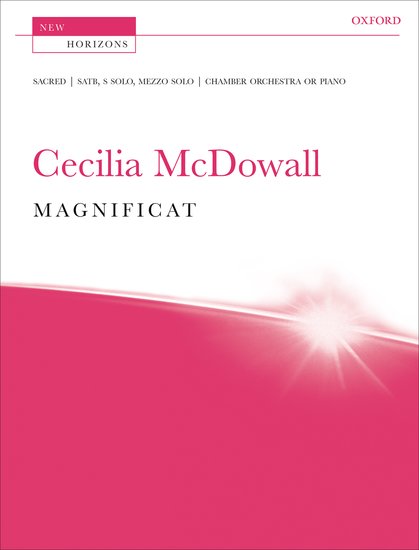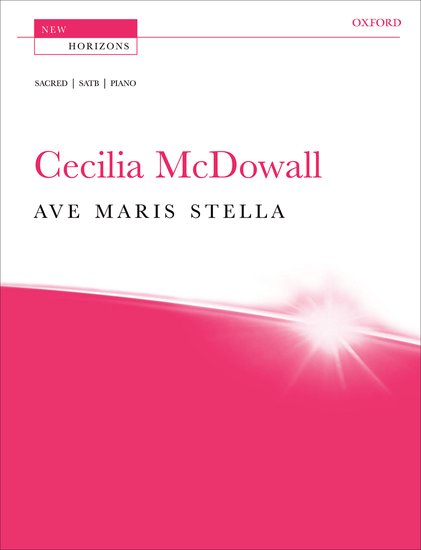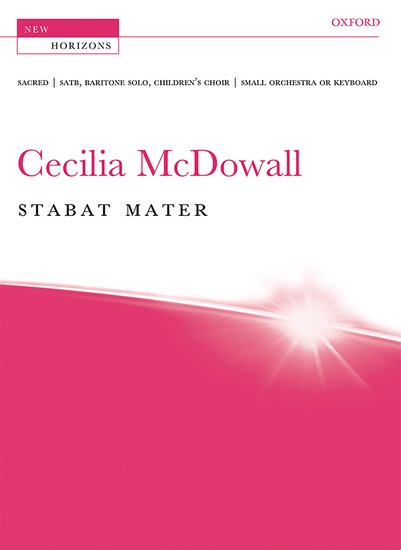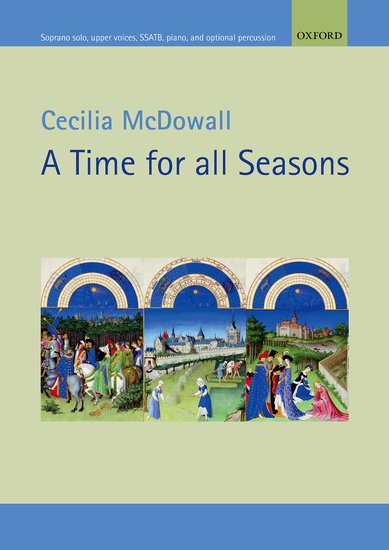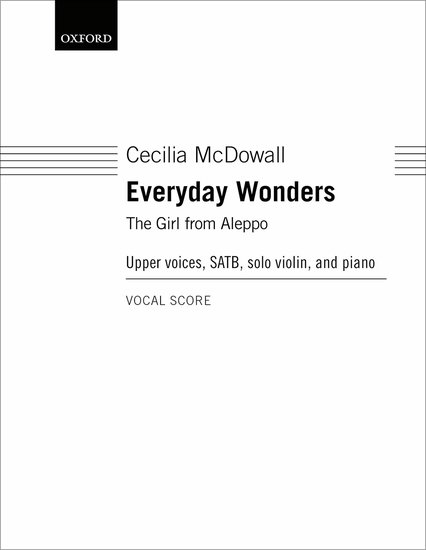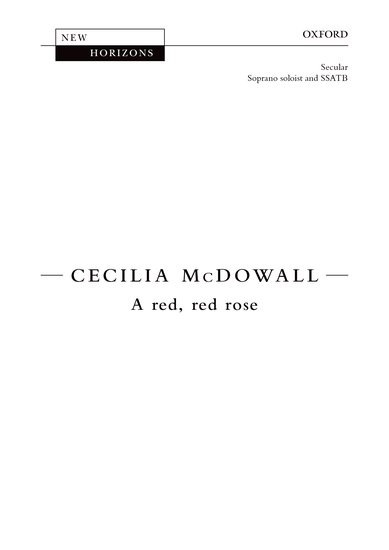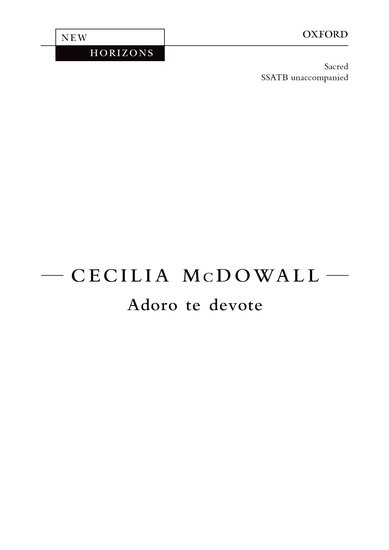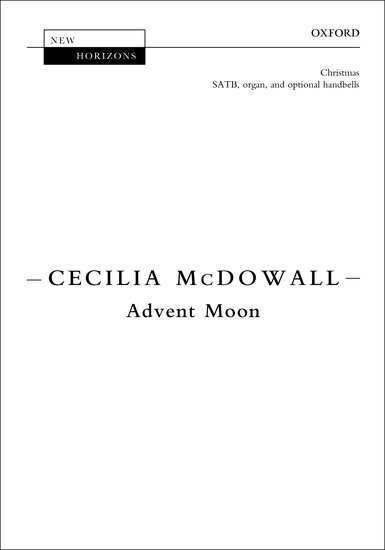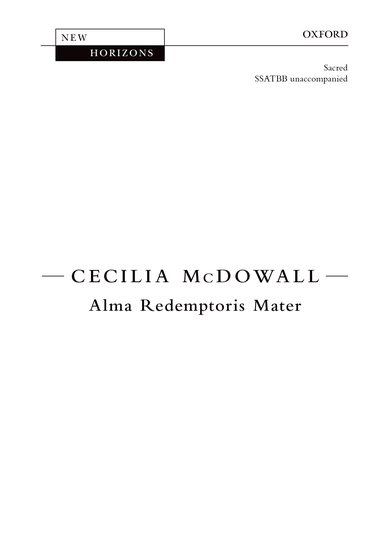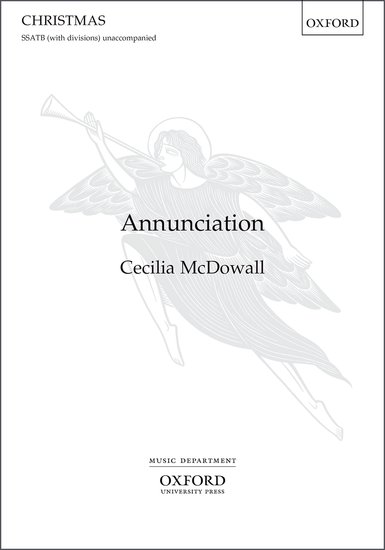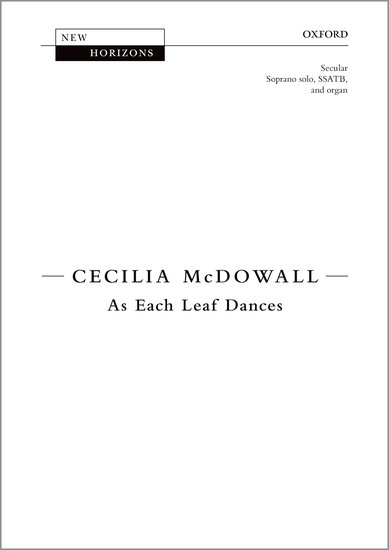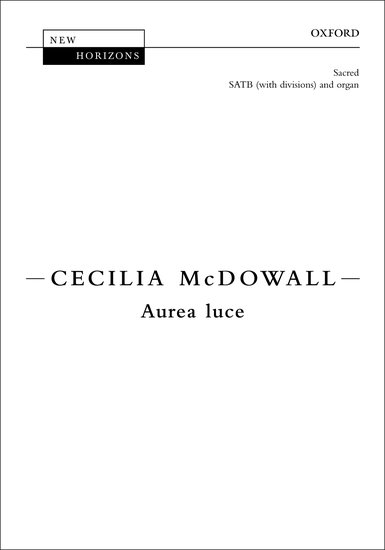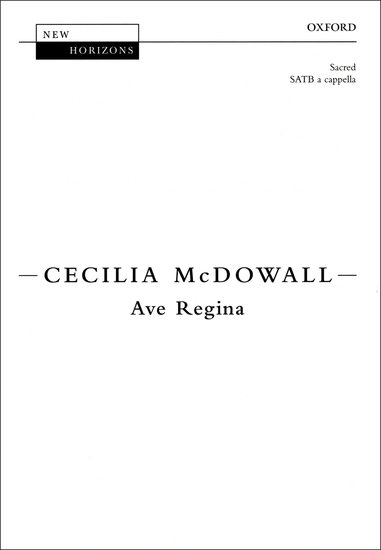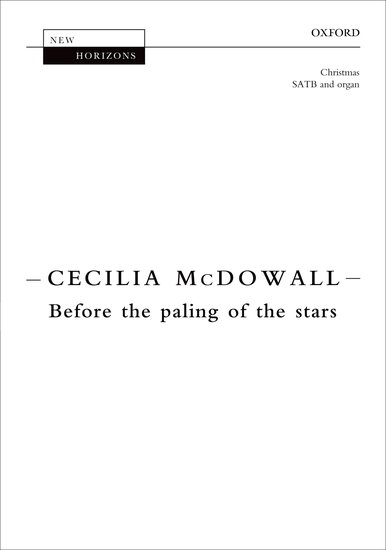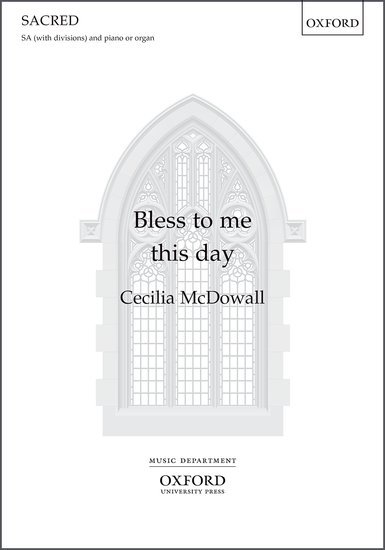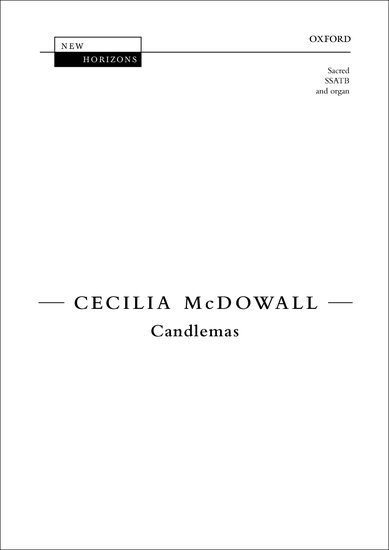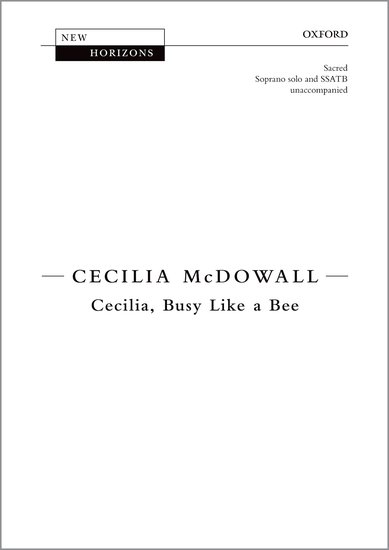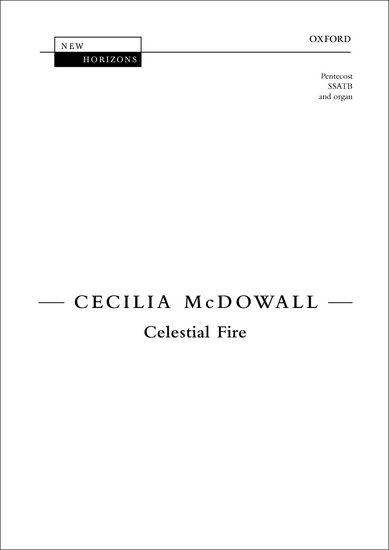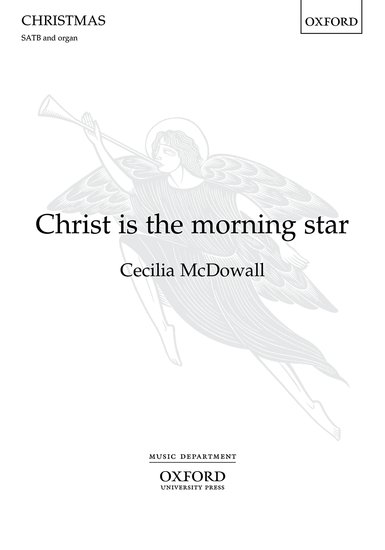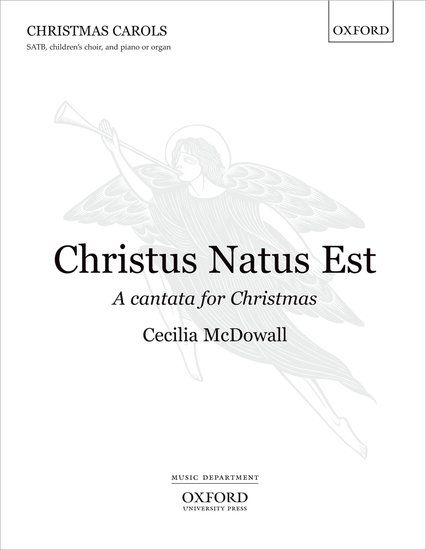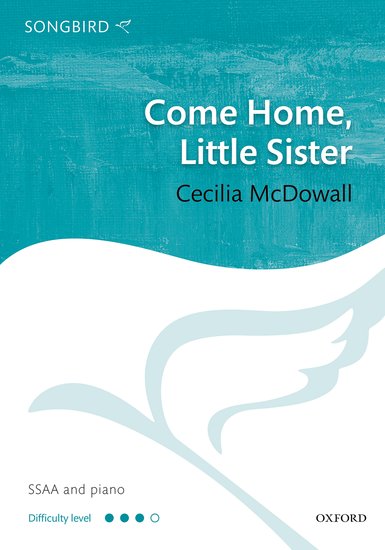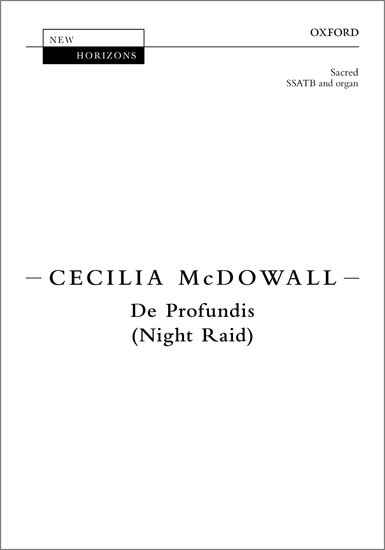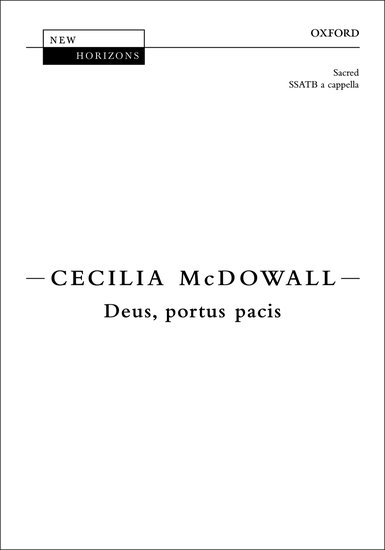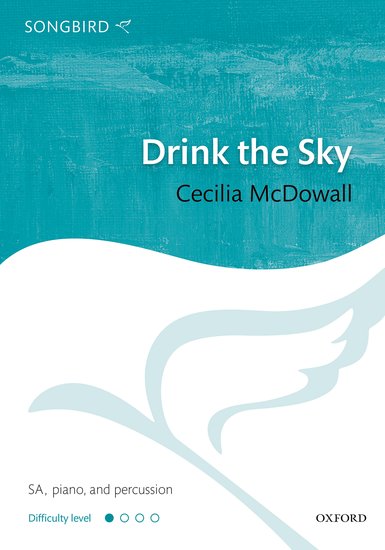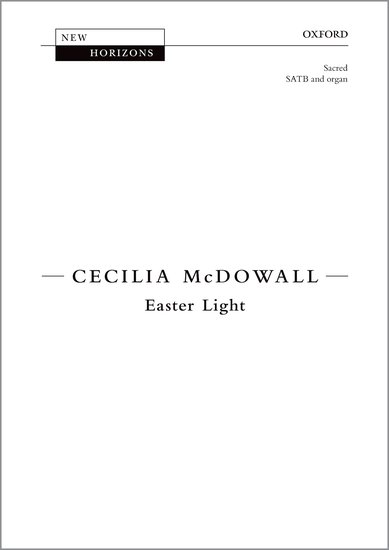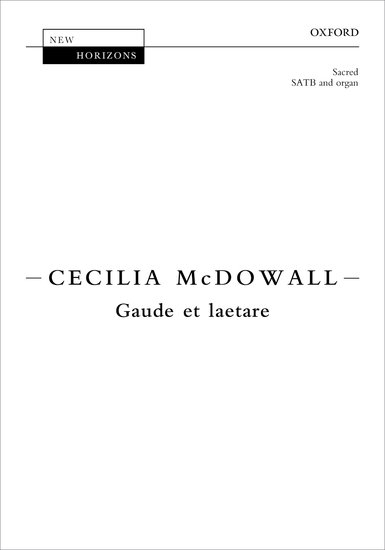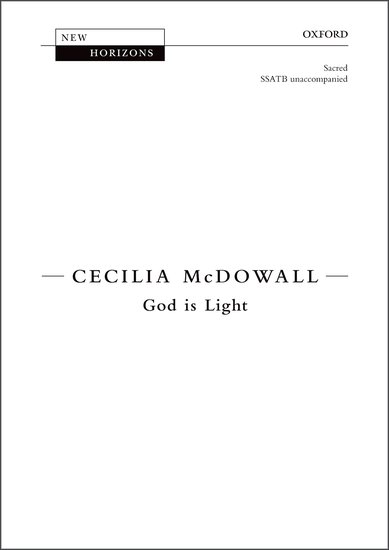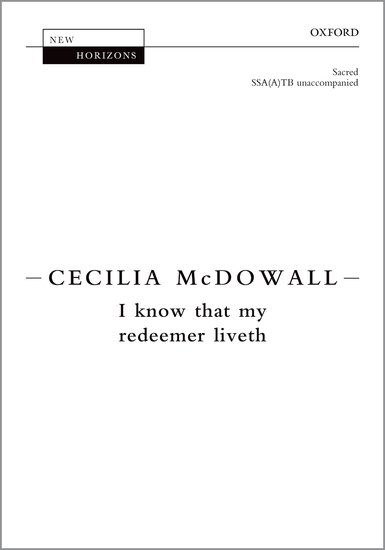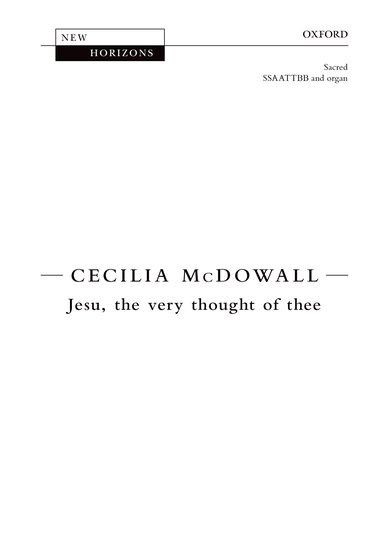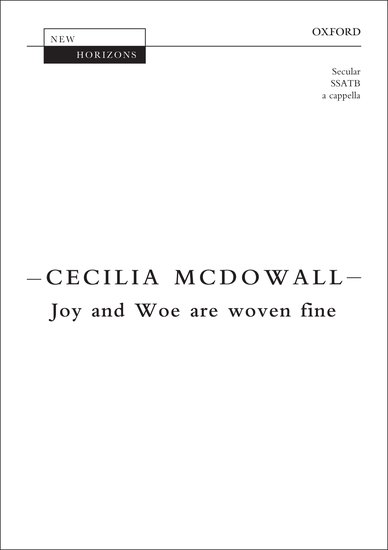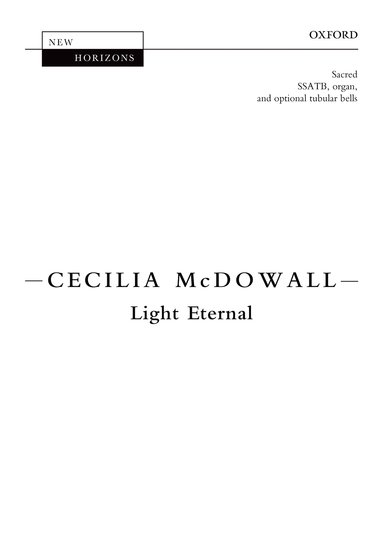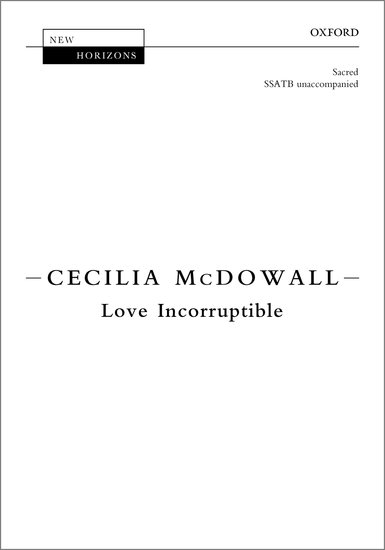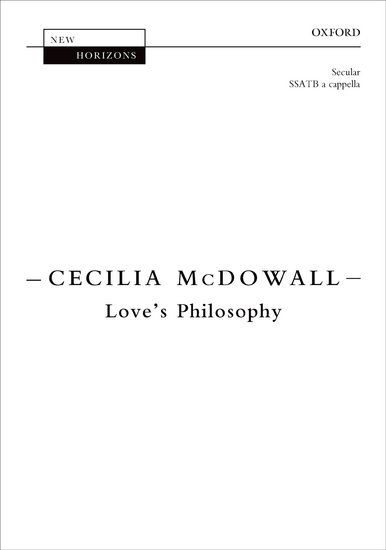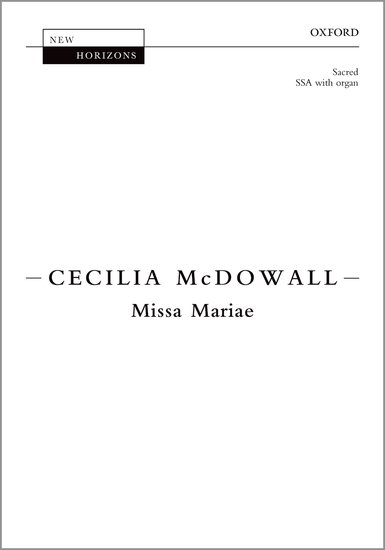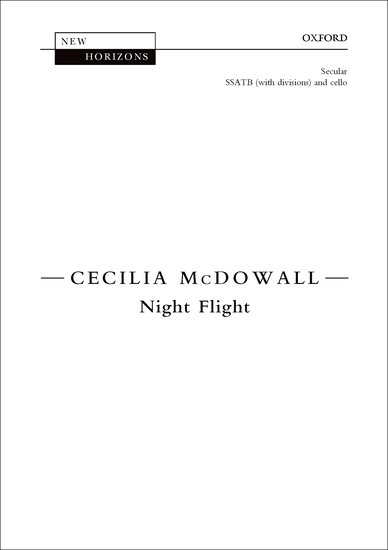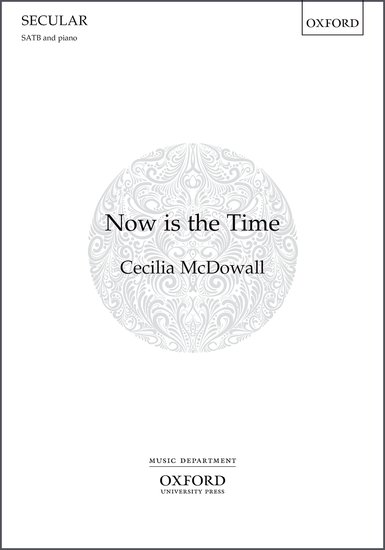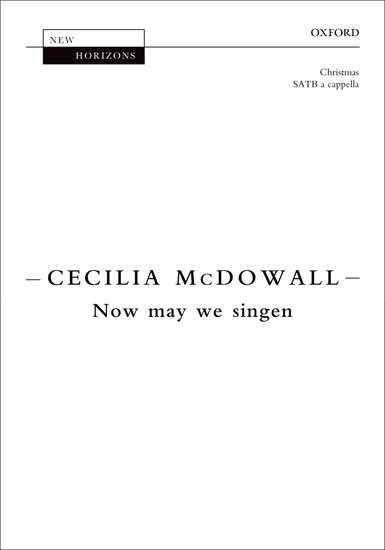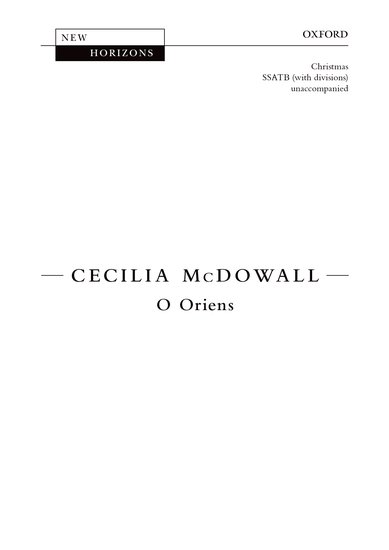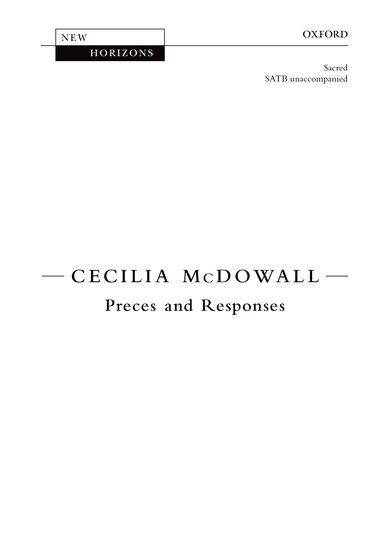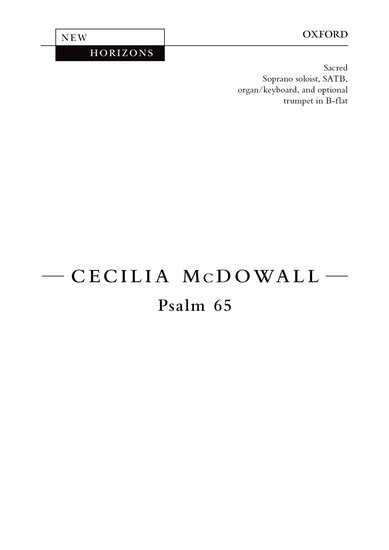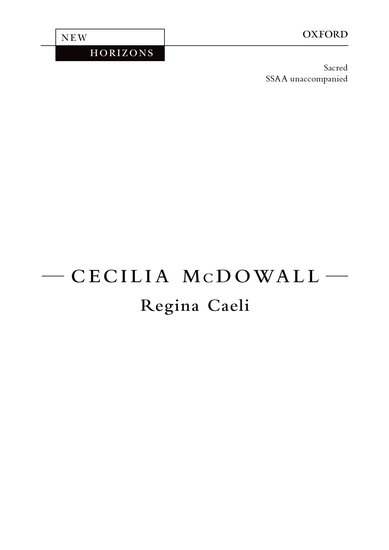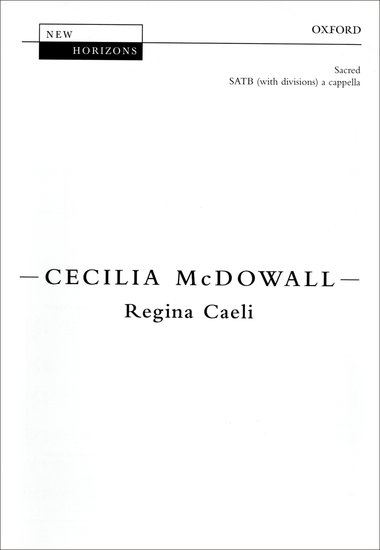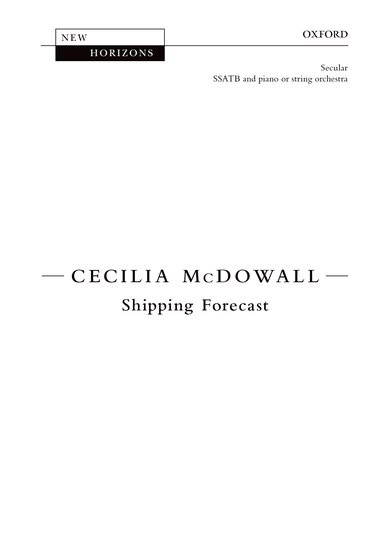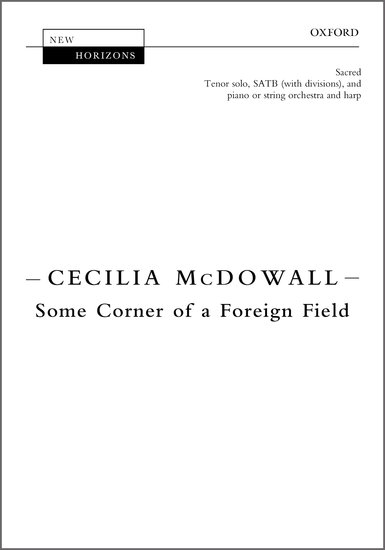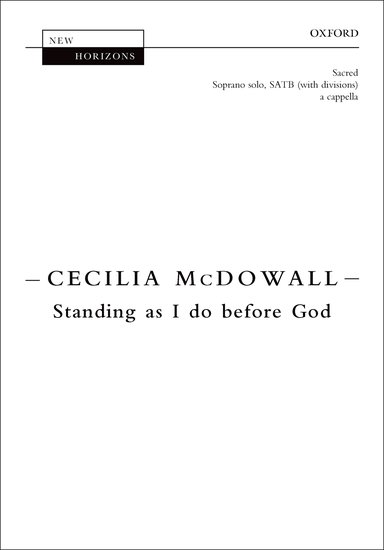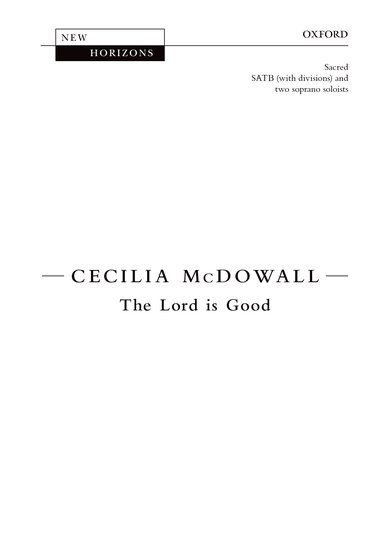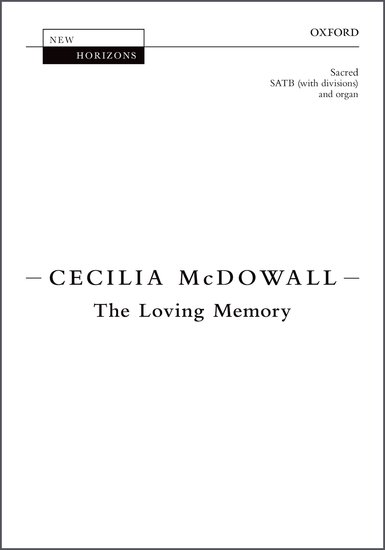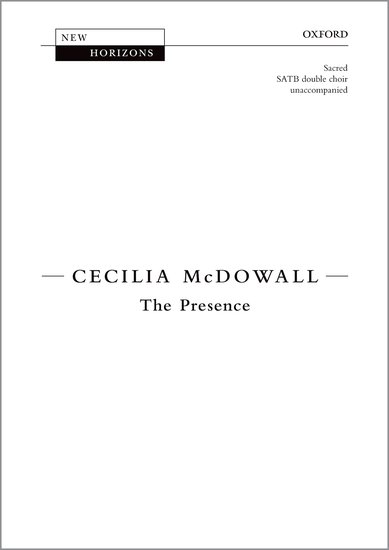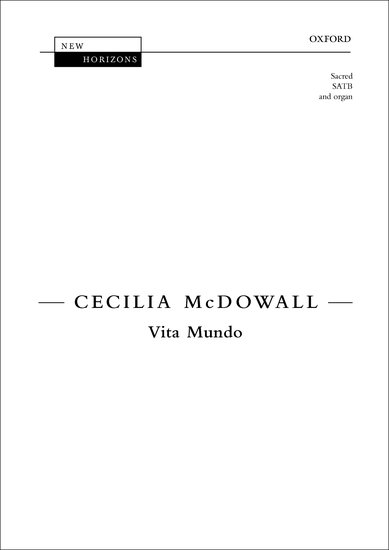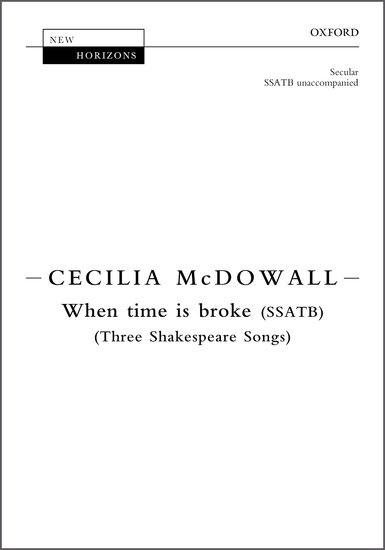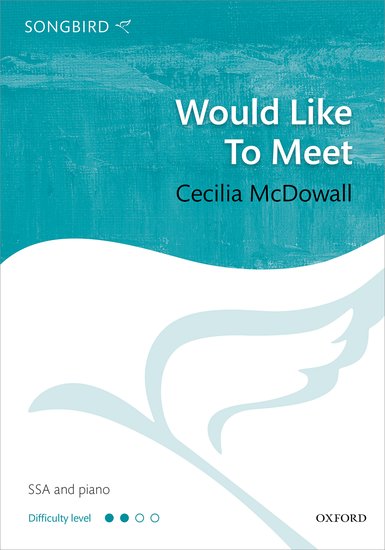In Celebration of the Human Voice - The Essential Musical Instrument
Home | Doo Wop | Barbershop | World | Contemporary | Christian | Vocal Jazz | Choral | Christmas | Instructional | Arrangements
Classical | Opera | Musicals | Personality | Young Singers | Disney | Videos | Songs | The Artists

Cecilia McDowall

Born in London,1951, Cecilia McDowall has won many awards and been eight times short-listed for the British Composer Awards. In 2014 she won the British Composer Award for Choral Music. Much of McDowall's choral music is performed worldwide, as well as her orchestral music. Recent important commissions include one for the BBC Singers, Westminster Cathedral Choir, London Mozart Players and a joint commission from the City of London Sinfonia. Three Latin Motets were recorded by the renowned American choir, Phoenix Chorale; this Chandos recording, Spotless Rose, won a Grammy award and was nominated for Best Classical Album. New commissions for 2016 include works for the BBC Singers, Choir of King's, Cambridge and a new song cycle for Roderick Williams, amongst others. In 2013 she received an Honorary Doctorate in Music from the University of Portsmouth. |
Songbooks, Arrangements and/or Media
Displaying 1-5 of 5 items.
Cecilia McDowall : Magnificat McDowall has skilfully united luscious harmonies with fresh melodies and crisp rhythms in this vibrant work. Divided into six movements, Magnificat is ideal for SATB choirs seeking fresh and inspiring new repertoire suitable for church or concert use. Songlist: Magnificat, Ecce enim ex hoc beatam, Quia fecit mihi magna, Et misericordia, Fecit potentiam, Deposuit potentes Cecilia McDowall : Ave maris stella This beautiful and moving piece in seven sections combines text from the Ave maris stella antiphon and Psalms 26 and 106. Starting and finishing in a mood of peace and certainty, the work is structured around a turbulent middle section anticipating the gathering storm. Cecilia McDowall : Stabat Mater McDowall's setting of the Stabat Mater has been described as 'an outstanding work of great solemnity and poignancy' (Tempo, 2013). The work comprises seven movements in a symmetrical structure-from the impassioned choral opening, through two intense yet diverse baritone solos and contemplative plainchant chorales, to the stately finale uniting all the voices. The optimistic central movement, in a major tonality, may be performed by children's choir or a semi-chorus of sopranos and altos from the main group. A plaintive meditation on the sorrows of the Virgin Mary as she stands by the Cross, McDowall's Stabat Mater is a sophisticated modern alternative to more well-known settings, ideal for performance at non-liturgical Lenten services. Songlist: Quis est homo qui non fleret, Pro peccatis suae gentis, Eia Mater, fons amoris, Sancta Mater, Virgo virginum praeclara, Inflammatus et accensus Cecilia McDowall : A Time for all Seasons A Time for all Seasons is an evocative cantata that explores the complexities of the human condition. The well-known To every thing there is a season text from Ecclesiastes is interwoven with a modern-day reworking of the verses by award-winning poet Kevin Crossley-Holland. McDowall's impressive range of musical styles, effective antiphonal writing, and artful juxtaposition of textures work together to create a meaningful experience for the listener. The work's scoring contributes to the narrative, with sections for solo soprano or full choir contrasting with prescient interjections from the uppervoice choir. The part for upper voices may also be sung by a children's choir, and there is an optional part for percussion. Cecilia McDowall : Everyday Wonders Everyday Wonders: The Girl from Aleppo tells the extraordinary story of Nujeen Mustafa, a Syrian teenager forced by war to flee her home and make a long and arduous journey to Europe with her sister, further complicated by cerebral palsy having confined her to a wheelchair. It sets a specially-written text by Kevin Crossley-Holland and is in three sections: 'Orphans of the World', centred on Nujeen's family life in Aleppo; 'My Journey', an account of a refugee's perilous route across borders and waters; and 'Everyday Wonders', where the teenager reflects on the 'everyday' joys of her new life. In response to the vivid text, McDowall has employed a wealth of musical effects, including rhythmic spoken sections, unpitched vocalizations depicting aircraft and gunfire, and a solo violin part is infused with Middle Eastern flavours. The prevailing mood of Nujeen's story is embodied by the final line of a chorale that opens and closes this unique concert work: 'singing the song of life itself'. |
Displaying 1-49 of 49 items.
Written for the wedding of the composer's niece in 2012, this piece affectionately sets a poem of the same title by Robert Burns. It was first performed by Chantage in London's Church of Scotland, St Columba's, conducted by James Davey. With something intrinsically Scottish about it, this tender setting of the well-loved poem, although written specifically for a wedding, would suit almost any occasion.
Poetry By: Robert Burns
Setting part of a Eucharistic hymn text by Thomas Aquinas, this piece is suitable for liturgical or concert use. Flowing and expressive, it features homophonic sections, melismatic lines, and optional soaring soprano solos. Adoro te devote is dedicated to the memory of the victims of the Nepalese Earthquake in 2015.
Through luminous choral harmonies, images of a winter night, and echoes of scripture, Advent Moon evokes deep human longing as well as the promise of the coming of light. The delicate organ accompaniment and optional handbells underscore both the haunting opening and the radiant conclusion of this piece.
A beautiful 6-part unaccompanied Marian motet written for the Marian Consort. The work combines reminiscences of Renaissance settings of this text with McDowall's distinctive contemporary voice.
A setting of William Drummond's text for SATB and organ written for David Wordsworth and the Addison Singers Oratorio Choir.
Annunciation is an expressive and expansive Advent carol based on words from John Donne's Holy Sonnets. McDowall creates a captivating atmosphere as the voices explore a soundworld that is mystical, reflective, and bright. The sensitive part-writing and accessible vocal lines will enable choirs of all types to profess the carol's message of 'salvation to all'.
As Each Leaf Dances is a setting of a powerful text by Kevin Crossley-Holland about the cruelty of child abuse being overcome by love and kindness. Reflecting this, the first section features a relentless organ part, jagged vocal lines, and dissonant harmonies, before giving way to a jaunty, dancing, and uplifting second section.
Commissioned and first performed by the choir of Liverpool Cathedral, this anthem is ideal for use during the Feast of Saints Peter and Paul. The choral lines move between sonorous homophonic writing and vibrant imitative passages, and are underpinned by a repeated quaver motif in the organ. Combining a sense of joy with moments of reflection, this anthem will particularly appeal to choirs looking to expand their choral repertoire.
No. 1 of McDowall's 'Three Latin Motets', Ave Regina is a gentle and lyrical setting of the text 'Hail, Queen of the Heavens'. The calm and memorable opening phrase is hinted at in passages of more intensity, and its partial statement at the end leaves it lingering after the voices have faded away. Ave Regina has been recorded by the renowned American choir, the Phoenix Chorale, and released on a Grammy award-winning CD by Chandos (Spotless Rose CHSA 5066)).
This tender carol sets an affecting text by Christina Rossetti that tells the story of Jesus's birth. In classic McDowall style, the setting explores a variety of choral textures and is interspersed with unexpected harmonies, creating a range of musical colours. The organ part provides a gentle, supportive accompaniment.
Bless to me this day is a tranquil setting of 'The Journey Prayer' from the Celtic compendium Carmina Gadelica. The sense of prescient optimism is captured in the flowing piano part, while the simplicity of the vocal lines enables the text to be imparted with warmth and sincerity.
McDowall's Candlemas is a celebratory and powerful piece. Making use of choral divisions and suspensions and a dynamic organ part, this setting of Denise Levertov's text (on the Presentation of Jesus at the Temple) is reverent, yet joyous, and is ideal for a liturgical setting.
Cecilia, Busy Like a Bee is a reflective and reverential setting of a text adapted from the Divine Office for St Cecilia's Day. The influence of plainchant is particularly apparent in the soprano solo, and McDowall intersperses effective imitative passages amidst homophonic writing with rich harmonies.
The hymn Come, Holy Ghost lies at the heart of Celestial Fire. Here, McDowall has woven the exquisite poetry of Denise Levertov into this expressive and uplifting piece. At times quietly meditative, Celestial Fire unfolds to a most joyous, affirmative conclusion. Celestial Fire was commissioned as part of a trilogy suitable for significant occasions during the church calendar year by Oakham School; the two other Oakham anthems for organ and mixed chorus are Light Eternal and Candlemas.
This lively setting of the Venerable Bede's Christ is the morning star features all the hallmarks of McDowall's original and vibrant style. With rich harmonies, compelling modulations, and a flowing organ accompaniment, this piece is perfect for services and concerts throughout Advent.
This accessible Christmas cantata presents a sequence of five carols, McDowall gives the familiar melodies a colourful new harmonic treatment, and the arrangements range in atmosphere from tenderness to joyful exaltation. The children's choir part is printed at the end of the score and may be photocopied.
This delicate, spring-like poem, by poet Kevin Crossley-Holland, is an affectionate salutation to a newborn babe. The poet tells that the parents couldn't decide on a name for their baby, and that instead of imposing an inappropriate name on her, they will welcome her into the garden of the world and wait for her to 'declare' herself. After a hushed introduction of whispered welcomes, the voices burst into a dance-like song in celebration of the new arrival's homecoming.
This atmospheric anthem by Cecilia McDowall commemorates the First World War. It sets a stark English text by Dr Joseph Spence alongside Latin text from Psalm 130, with the words 'In memoriam' added. The lower parts sing Spence's English text, conveying the relentless hardship of life in the trenches with declamatory and constantly developing vocal lines. The sopranos, meanwhile, repeat the Latin words from Psalm 130, providing a striking contrast in their constancy and otherworldliness.
First performed by the choirs of St Paul's, Westminster Cathedral, and Westminster Abbey, this anthem sets a medieval English poem to contemplative music with all the hallmarks of McDowall's style: expressive melismas, well-placed astringent harmonies, and a strong modal feel. Ideal for cathedral and other church choirs. Pronunciation guide and modern rendition of the text included.
This is an uplifting and expressive setting of a fun, descriptive text by Christie Dickason that characterizes the sky in an imaginative way. The compelling melodies are underpinned by a dynamic piano part, often featuring rippling quavers, and charcterful interjections from the glockenspiel and suspended cymbal complement the narrative. A contrasting middle section in triple time quotes from the Northumbrian folk song 'When the boat comes in', while the final section is affirmatory in feel, emphatically repeating the final line of the poem, 'and I will grow'.
With a newly written text by Angier Brock, this compelling anthem by Cecilia McDowall is a welcome addition to the traditional Easter repertoire. Easter Light explores a variety of styles and colours, from organ solos suggestive of the song of the Eastern meadowlark to a meditative section in the manner of plainchant.
For this joyous piece, McDowall set a text from the Ambrosian Rite celebrating the Virgin Mary's recent motherhood. The lively organ accompaniment and strong rhythmic drive create an instantly celebratory mood, making the piece an ideal conclusion for any Christmas service.
Commissioned by Ralph Woodward and the Fairhaven Singers in memory of Dora Kemp, one of the choir's sopranos, God is Light sets lines from Psalm 139, 1 Thessalonians, and 1 John. It moves from an unsettled tonality at the beginning, through anguished false relations and wistful expressivity, to find triumphant resolution in a blazing A major at the end. Like all of McDowall's music, it is well crafted and singable.
God is Light was first performed on 12 November 2016 in Queens' College Chapel, Cambridge, by the Fairheaven Singers and Perse Prep Senior Choir (director Paul Harris), conducted by Ralph Woodward.
This attractive motet was written for performance alongside Brahms's Requiem, following the precedent of Handel's famous setting of the same text being sung at the premiere of the Brahms in 1868. The gracefully sculpted music clothes the text with touching melodies, expressive harmonies and varied sonorities.
This poignant anthem was originally composed to be sung at a funeral. It is a beautifully composed work, sufficiently sombre for such an occasion, but with a celebratory element which is uplifting and comforting.
This expressive Wedding anthem sets an extract from William Blake's Auguries of Innocence. With chromatic inflections and gently arching vocal lines, the music perfectly reflects the text's emphasis on the relationship between pleasure and sorrow. Joy and Woe are woven fine will make a striking addition to the repertory of more experienced choirs looking to try something new.
Light Eternal brings together the liturgical text for Remembrance, Lux Aeterna, and the evocative poetry of Denise Levertov. Commissioned as part of a trilogy, Light Eternal has a haunting and exotic quality, the music beautifully illustrating the sense of the texts. The anthem was first performed on Armistice Day 2012 by the Oakham Chapel School Choir and conducted by Peter Davis. Suitable for Remembrance and other occasions of solemn commemoration.
Love Incorruptible sets words from Ephesians that explore the themes of love and kindness. The anthem begins with the directive 'Let all bitterness and wrath and anger be put away, awake!', set by the composer in a way that engenders a mood of reflection and hopefulness. The tender central section is built around the words 'Be kind, tender-hearted, one to another', while the closing section presents a compelling contrast of emphatic 'awake!' declarations in the upper voices and punchily rhythmic repetitions of the titular words in the lower voices.
Setting a well-known poem by Percy Shelley, Love's Philosophy is a sweet and tender choral song reflecting on the idea of love with reference to nature and the interdependent relationships evident in the world around us. Mellifluous choral writing and sighing 'ah' interjections convey the sometimes wistful feel of Shelley's words, and numerous repetitions of 'thou' at the end of the piece emphasize the theme of unrequited or lost love.
This concise Latin mass setting is entirely suitable for liturgical use, but the sharply delineated characters of the different movements make it also an appealing concert work. The organ part is supportive, but full of interest and not merely accompanimental. Particularly memorable are the jaunty Gloria, with its constantly shifting time-signatures, and the haunting Agnus Dei.
Night Flight was written to mark the centenary of Harriet Quimby's pioneering flight across the English channel. Setting texts by Sheila Bryer on the mysterious powers of the sea, earth, and air, McDowall uses vocal clusters and haunting solo cello lines to highlight the sense of fear, awe, and majesty experienced by an individual pitted against the elements. Cecilia McDowall was awarded the 2014 British Composer Award in the Choral category for Night Flight.
Written for the 2016 'Requiem to Cancer' event at St Paul's Church, Covent Garden, Now is the Time sets hopeful and inspirational words by Marie Curie. McDowall's setting is optimistic and appealing, with charming interplay between the voices and piano.
Setting a fifteenth-century English text containing some short Latin passages, this is a joyful, dance-like carol with a medieval feel. The spirited, lilting melody begins in the sopranos and altos but is passed round the choir, while the other voices add stirring harmonies and bell-like drones to the texture. Now may we singen was originally published in the New Horizons collection The Ivy and the Holly.
A setting of one of the seven Advent 'O' Antiphons, O Oriens makes use of luxurious and exotic harmonies, creating a shimmering texture reminiscent of the biblical Morning Star referenced in the title. The focus on human enlightenment in winter's darkness means the piece is equally suitable for secular celebrations of Christmas. It was commissioned for the Choir of Merton College, Oxford, and in 2013 was shortlisted for a British Composer Award.
This set of Preces and Responses was commissioned by the London Festival of Contemporary Church Music for their 2010 festival. The work is uplifting, beautifully crafted, and perfect for those seeking new material for the liturgy.
This joyful and richly expressive choral cantata is a setting of what is often thought of as a Thanksgiving psalm or a psalm in praise of Harvest time. From its atmospheric opening through to its upbeat ending, the work contrasts driving rhythms with quietly reflective passages for soprano solo. It can be performed with or without trumpet. Suitable for any celebratory occasion, Psalm 65 is a vibrant concert work and a great joy to sing.
Originally written for SATB, this hymn to the 'Queen of the Heavens' is a glorious work, replete with dramatic changes of mood and texture. The majestic chords of the opening bars quickly give way to a spirited exchange between the voices. This pattern of contrasts is repeated throughout the piece before the final jubilant chords fade away to pianissimo. This is an approachable and rewarding motet, appropriate for any time of the year and in particular, the Feast of the Blessed Virgin Mary and Eastertide. The original SATB version of Regina Caeli has also been recorded by the renowned American choir, the Phoenix Chorale, and released on a Grammy award-winning CD by Chandos (Spotless Rose CHSA 5066).
This hymn to the 'Queen of the Heavens' is a glorious work, replete with dramatic changes of mood and texture. The majestic chords of the opening bars quickly give way to a spirited section in which unison altos and basses mimic the insistent flourishes of the sopranos and tenors. This pattern of contrasts is repeated throughout the piece before the final jubilant chords fade away to a modest triple piano. This is an approachable and rewarding motet, appropriate for the Feast of the Blessed Virgin Mary in addition to Eastertide.
Regina caeli has been recorded by the renowned American choir, the Phoenix Chorale, and released on a Grammy award-winning CD by Chandos (Spotless Rose CHSA 5066)
The Shipping Forecast is in 3 movements: 'Donegal', 'They that go down to the sea in ships', and 'Naming'. The first and last movement are settings of poems by the poet, broadcaster, and academic, Seán Street. In 'Donegal' snatches of the shipping forecast (spoken) are woven into the atmospheric texture of the poem. The second movement is a setting of the Psalm 107: 23-26 | 28-29: 'They that go down to the sea in ships'. The setting has the feel of a Celtic lullaby, moving from a simple statement to a centre of turmoil then back to overlapping phrases, melting into tranquillity at the end. In the final movement, 'Naming', the text becomes 'a meditation on the fortunes of the sea as reflected in other names, gathered from coastal maps of Newfoundland'. Energetic, in perpetual motion and rhythmic, 'Naming' drives the whole work to an upbeat finish.
Written as part of McDowall's tenure as composer in residence at Dulwich College, Some corner of a foreign field was commissioned to mark the centenary of the First World War. A profoundly moving cantata, it draws on biblical texts associated with the acclaimed pupil of Dulwich College, Sir Ernest Shackleton, his 1916 Antarctic Expedition, and Rupert Brooke, the centenary of whose death falls on 2015. This beautiful work, with its lustrous harmonies and its poignant tenor solo, offers choirs an immensely rewarding experience.
Setting a text spoken by Nurse Edith Cavell on the eve of her execution in 1915 and re-fashioned by the poet Seán Street, McDowall has created a work of haunting beauty full of gently lamenting harmonies.The sombre subject matter makes the piece equally suitable for funerals and Remembrance Day celebrations. Standing as I do before God is featured on the CD A Multitude of Voices by the choir Sospiri on Convivium Records.
This engagingly written piece sets the Lamentations of Jeremiah. The overlapping passages of music passed between the soloists and the choir create a dramatic effect, whilst the harmonic language gives the music a sense of regret.
This joyous, upbeat anthem sets a compelling poem by contemporary poet Se'an Street in response to a text by sixteenth-century Bishop of Norwich John Parkhurst on the subject of 'alma mater'. The text encourages us to appreciate the past, our education, and where it can lead, reflecting on the profound ties we can form to a time or a place. The bright, driving organ part, with solo interjections, is juxtaposed with sustained vocal writing with rich, lush harmonies.
Written for the Choir of St Mary's Episcopal Cathedral, Edinburgh, The Presence sets lines from Psalms 18, 27, 36, 112, and 119. It was inspired by A. E. Borthwick's painting of the same title, which hangs in St Mary's, and the texts chosen are mainly concerned with light. The performance directions used - 'luminous', 'resonant', 'dark', 'ethereal' - express the setting's intense atmosphere and almost visual sense of space and lustre. While suitable for services and concerts throughout the year, The Presence is especially appropriate for performance during Advent.
Written for the Choir of St Mary's Episcopal Cathedral, Edinburgh, The Presence sets lines from Psalms 18, 27, 36, 112, and 119. It was inspired by A. E. Borthwick's painting of the same title, which hangs in St Mary's, and the texts chosen are mainly concerned with light. The performance directions used - 'luminous', 'resonant', 'dark', 'ethereal' - express the setting's intense atmosphere and almost visual sense of space and lustre. While suitable for services and concerts throughout the year, The Presence is especially appropriate for performance during Advent.
Unless the Lord builds the house), this compelling anthem possesses a luminescent quality supported by radiant harmonic textures. It is framed by Latin text taken from the Saxon stone cross at St Paul's, Jarrow, associated with St Bede, and set in quasi-plainchant fashion. Psalm 127 is one of the Psalms of Ascent, often occurring throughout the liturgical calendar. With an elegant simplicity Vita Mundo is uplifting and rewarding to sing.<
Cecilia McDowall's fresh and appealing style is amply displayed in this cycle, subtitled 'Three Shakespeare Songs' and first performed by the BBC Singers. In total, six Shakespeare texts are used, and McDowall's response encompasses a fleet-footed impression of Scottish fiddle music, a gorgeously plangent slow movement, and a helter-skelter finale that broadens to a mysteriously pitchless ending.
Also available for SSAA.
Cecilia McDowall's fresh and appealing style is amply displayed in this cycle, subtitled 'Three Shakespeare Songs'. In total, six Shakespeare texts are used, and McDowall's response encompasses a fleet-footed impression of Scottish fiddle music, a gorgeously plangent slow movement, and a helter-skelter finale that broadens to a mysteriously pitchless ending. Also available for SSATB.
Would Like To Meet is taken from a suite of three pieces by Cecilia McDowall called Lonely Hearts, composed in 2005. The whimsical text by Christie Dickinson is a lonely hearts column written from the perspective of various animals and plants, and this imaginative theme is perfectly complemented by McDowall's spirited and fun setting. The mood is light and energetic, the piano part characterful, and the accessible and appealing vocal lines feature interspersions of scat writing.
Lonely Hearts features on a 2007 CD dedicated to the composer's music recorded on the Dutton label.
![]() Vocal Harmony Arrangements - Home
Vocal Harmony Arrangements - Home
Christian | Gospel | Standards | Musicals | Specialty | World | Barbershop | Contemporary | Vocal Jazz | Choral | Christmas
Mixed Voices | Female | Male | 8 Parts | 6 Parts | 5 Parts | 3 Parts | 2 Parts | Medleys | Solo | Folio Series | New Releases
Select a Category |
Want to Sing? - Find a Chorus Near You
List of Choruses by State | List of Choruses by City

